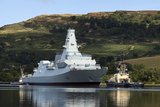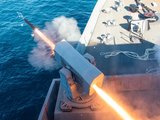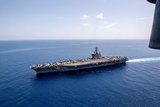Shadow looms over UK amphibious capabilities
The future of the UK’s amphibious capabilities looks increasingly uncertain as the defence minister suggested it may no longer be a strategic priority.
At a meeting of the UK's defence committee, Secretary of State for Defence Michael Fallon was grilled on reports that the level of defence budget cuts was leading the MoD to consider a significant reduction in the armed force's amphibious landing capability.
The concerns were prompted by reports, since ‘categorically’ denied by the MoD, that Chile and Brazil could acquire HMS Albion and Bulwark in the near future despite currently being scheduled for decommission in 2033 and 2034
Already have an account? Log in
Want to keep reading this article?
More from Naval Warfare
-
![US Navy to develop an undersea networking capability to support UUV operations]()
US Navy to develop an undersea networking capability to support UUV operations
The NEREUS project aims to enhance and expand the US Navy’s existing communications systems, enabling crewed/uncrewed seabed and subsurface missions.
-
![How the Hedge Strategy will impact the US Navy’s future capabilities]()
How the Hedge Strategy will impact the US Navy’s future capabilities
The US Navy Hedge Strategy is intended to provide a lethal, modular and cost-effective fleet while accepting Washington’s fiscal and industrial constraints.
-
![US Navy and Raytheon explore additional applications for Mk 58 CRAW torpedo]()
US Navy and Raytheon explore additional applications for Mk 58 CRAW torpedo
Designed as an anti-torpedo and anti-submarine capability, the USN and RTX foresee the Compact Rapid Attack Weapon’s potential for deployment from surface ships and aerial and uncrewed platforms.
-
![European navies line up $105.8 billion in unawarded contracts for 2026]()
European navies line up $105.8 billion in unawarded contracts for 2026
France, Germany and Italy lead the way on unawarded naval defence opportunities that could be awarded this year, but across Europe countries are ramping up their spending efforts to face geopolitical challenges.






















